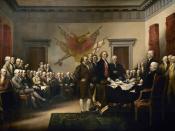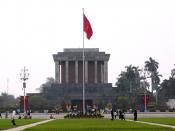President Ho Chi Minh's Declaration of Independence marked a turning point in Vietnam's history, bringing independence to the nation and freedom to the people. Historians somewhat incorrectly note that Ho Chi Minh opened Viet Nam's "Declaration of Independence" by quoting the U.S. "Declaration." Ho delivered his reading of the Vietnamese document more than thirty years after he had lived in New York and Boston. A brilliant man, Ho may have committed the American quote to memory; however, Ho checked the quote's accuracy as he was finishing his draft. Further, it is now clear that Ho intentionally altered his quotation from the U.S. version.
The U.S. "Declaration" reads: "We hold these truths to be self-evident, that all men (italics mine) are created equal... (Bizzel & Herzberg)." When the U.S. "Declaration" was signed in 1776, "men" meant "white men of property," where property often included black slaves. Black Americans did not secure the right to vote until ninety-five years later.
American women gained the right to vote fifty years later still and only after years of protest. Interestingly, the year of the largest women's suffrage demonstrations before World War I was 1913, the very year Ho Chi Minh lived in New York and Boston.
In contrast to the U.S. "Declaration of Independence," Ho Chi Minh's version begins: "All people (emphasis mine) are created equal (Bizzel & Herzberg)." With the exception of the Viet Minh, the society Ho Chi Minh rose to address with Viet Nam's "Declaration of Independence" on September 2, 1945 was Confucian. Women belonged first to their fathers, then to their husbands, and, at their husband's death, to their eldest sons. A woman was not a person with a legal identity unto herself. Ho Chi Minh had lived in both the United States and England. He was fluent...


